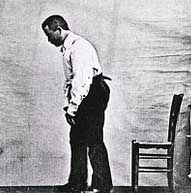|
Parkinsons DiseaseWhat is Parkinson's Disease?age-well.org > prevent age related diseases > Parkinsons Disease 
Mohammed Ali (Cassius Clay) has done much to raise public awareness about Parkinsons - Public Domain Photo N amed after a British physician who first described this disorder in 1817, this disease is a neurological disorder (which is distinct to other neurological disorders such as Alzheimer's but can occur at the same time). This disorder is localized in a part of the brain called the 'substantia nigra'. The neurons here degenerate and are no longer creating the dopamine necessary for the same susbstantia nigra to transmit signals to the corpus striatum area. Without this transmission which is necessary for the brain's natural process in operating body movement, all body movements are impaired. In addition to the loss of dopamine, there is often a loss of norepinephrine, another neurotransmitter, responsible this time for sympathetic nervous system functions, the lack of which causes fatigue and abnormal blood pressure behavior.CausesParkinson’s Disease (PD) is generally considered idiopathic, which means that there is no cause as yet scientifically proven. Current research has brought initial results to suggest a link with genetics and with an exposure to toxins (occupational and environmental). The genetic link alone is relatively low since only 2-5% of people with a known relative who has PD will develop PD and this is why scientists believe it is a combination of genetics and environment which create the most likely trigger. In some rare cases there has been an association to a type of virus but these are based on very special sample populations for example the 1918 influenza epidemic victims and a group of women in Taiwan who later recovered from PD. Who is at Risk ?There is a higher incidence of PD in men than women (50% more), and according to some studies in developed countries, which could be due to the exposure of environmental toxins and pesticides. Typically the disease begins to develop after the age of 50 with the average onset age of 60, however in 5-10% of cases this can happen before 50 and in very rare circumstances can occur before the age of 20. Four Main SymptomsThere is currently no definitive test for PD and the symptoms below are often mistaken for other disorders or simply old age. Symptoms can start or progress differently for each individual and there is a wide variety of secondary symptoms which may or may not be present. 1. Tremor, often starts in the hands and is typically a rythmic motion however it also affects the legs, feet and jaw. 2. Rigidity, the limbs move awkwardly in short jerky movements. 3. Bradykinesia, slowness of movement which can increase routine tasks from minutes to hours 4. Postural instability, impaired balance. Secondary SymptomsThese symptoms vary significantly between individuals both in occurrence and intensity, however there are many treatments and strategies for eliminating or reducing them.
Treatment and Cures
Parkinsons patient circa 1892 - Public Domain Photo By the time symptoms appear, PD patients have often loss between 60 and 80% of the nerve endings in the substantia nigra, and this cannot be recovered. Life expectancy is the same with PD as for those who do not have it and new research is showing more and more solutions for improved quality of life. The speed of the progression of the disease varies between individuals, typically 20 years or more but it does always progress. Nowadays PD is treated mainly with drugs which alleviate and counteract the different symptoms and with 'Deep Brain Stimulation'. This technique consists of surgically implanting electrodes in the brain and collarbone, which connected via a wire under the skin stimulate and aid the brain to overcome the tremor, rigidity and slowness of movements. Surgery is only rarely used for people with advanced PD who do not respond to drug therapy. PreventionThere is a lot of research underway Currently there is no scientifically proven dietary factor which could prevent or treat PD but science is looking more closely at antioxidants, caffeine and overall reduction of calories. And the newsfeed on the right of this page has been included so that you will learn the latest developments at the same time as we do.
For more information on Parkinson's disease, please visit: http://en.wikipedia.org/wiki/Parkinson%27s_disease age-well.org > prevent age related diseases > Parkinsons Disease Top of Parkinsons Disease |
Translate this Site
Search this Site
List of Conditions
|
Alcoholic Liver
|
|
Alzheimers Disease
|
|
Arterioslerosis
|
|
Age-Related Cancer
|
|
Cataracts
|
|
Cholesterol
|
|
Colds and Flu
|
|
Depression
|
|
Diabetes
|
|
Dementia
|
|
Dry Eye
|
|
Enlarged Prostate
|
|
Fibromyalgia
|
|
Glaucoma
|
|
Hair Loss
|
|
Halitosis
|
| Heart Attack
|
| Herniated Disc
|
|
High Blood Pressure
|
|
Incontinence
|
|
Influenza
|
|
Lower Back Pain
|
|
Macular Degeneration
|
|
Menopause
|
|
Osteoarthritis
|
Osteoporosis
|
|
Parkinson's Disease
|
|
Peri-Menopause
|
|
Presbycusis
|
|
Presbyopea
|
|
Prediabetes
|
|
Sarcopenia
|
|
Stroke
|
|
Shingles
|
|
Swineflu
|
Develop Smart Habits
|
Lose Extra Weight
|
|
Lose Bellyfat
|
|
Quit Smoking
|
|
Reduce Alcohol
|
|
Get Enough Sleep
|
|
Eat Healthily
|
|
Cut Down on Salt
|
|
Cut down on sugar
|
|
Avoid Transfats
|
|
Follow the DASH Diet
|
|
Drink Plenty of Water
|
|
Exercise Regularly
|
|
Manage Stress
|
|
Get Your 5 a Day
|
| Eat a Healthy Breakfast
|
|
Get Enough Calcium
|
|
Practice Good Oral Hygiene
|
|
Think Positive
|
Healthy Digestion
|
The Digestive System
|
|
The Intestines
|
|
Prevent Constipation
|
About this Site







